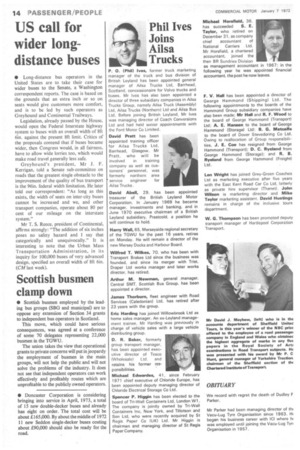US call for wider long distance buses
Page 16

If you've noticed an error in this article please click here to report it so we can fix it.
• Long-distance bus operators in the United States are to take their case for wider buses to the Senate, a Washington correspondent reports. The case is based on the grounds that an extra inch or so on seats would give customers more comfort, and is to be led by such operators as Greyhound and Continental Trailways.
Legislation, already passed by the House, would open the Federal Interstate highway system to buses with an overall width of 8ft 6in. against the present 8ft limit. Critics of the proposals contend that if buses became wider, then Congress would, in all fairness, have to allow wide lorries too, which would make road travel generally less safe.
Greyhound's president, Mr J. F. Kerrigan, told a Senate sub-committee on roads that the greatest single obstacle to the improvement of the quality of bus transport is the 96in. federal width limitation. He later told our correspondent: "As long as this exists, the width of seats on inter-city buses cannot be increased and we, and other transport companies, operate about 80 per cent of our mileage on the interstate system."
Mr T. S. Reece, president of Continental, affirms strongly: "The addition of six inches poses no safety hazard and I say that categorically and unequivocally." It is interesting to note that the Urban Mass Transportation Administration, in its inquiry for 100,000 buses of very advanced design, specified an overall width of 8ft 6in. (CM last week).
Scottish busmen clamp down
• Scottish busmen employed by the leading bus groups (SBG and municipal) are to oppose any extension of Section 34 grants to independent bus operators in Scotland.
This move, which could have serious consequences, was agreed at a conference of some 70 delegates representing 22,000 busmen in the TGWU.
The union takes the view that operational grants to private concerns will put in jeopardy the employment of busmen in the main groups, will not help the public and will not solve the problems of the industry. It does not see that independent operators can work effectively and profitably routes which are unprofitable to the publicly owned operators.
• Doncaster Corporation is considering bringing into service in April, 1973, a total of 15 new double-decker buses and already has eight on order. The total cost will be about £165,000. By about the middle of 1972 11 new Seddon single-decker buses costing about £90,000 should also be ready for the road.




















































































